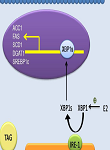|
|
|
The Mediation of Hepatic Lipogenesis Through Estrogens
|
|
|
|
|
|
|
|
|
|

|
|
|
Colette N. Miller, Mary Anne Della-Fera, Clifton A. Baile
|
|
|
|
University of Georgia
|
1Department of Foods and Nutrition, University of Georgia, Athens, Georgia; 2Animal and Dairy Science, University of Georgia, Athens, Georgia
|
|
cnmiller@uga.edu
|
|
|
|
|
|
|
|
|
|

|
|
Estrogens have been shown to protect against various diseases and disastrous metabolic consequences of poor diets. Although a large body of research demonstrates estrogen’s ability to control food intake, adipogenesis, and oxidative stress, research regarding the effects of estrogens on hepatic lipogenesis, steatosis, and non-alcoholic fatty liver disease is only now accumulating. Estrogen deficiency in both human and rodent models directly results in the upregulation of hepatic lipogenic signaling - in both serum and hepatic triglyceride content - which leads to the development of fatty liver. In all models, estrogen replacement completely reverses these outcomes. Similar to the endogenous estrogen hormone, plant-derived phytoestrogens also appear to have beneficial effects related to prevention of hepatic lipogenic signaling and steatosis in rodent models. Additionally,......................
|
|
|
|
|
|
|
|

|
|